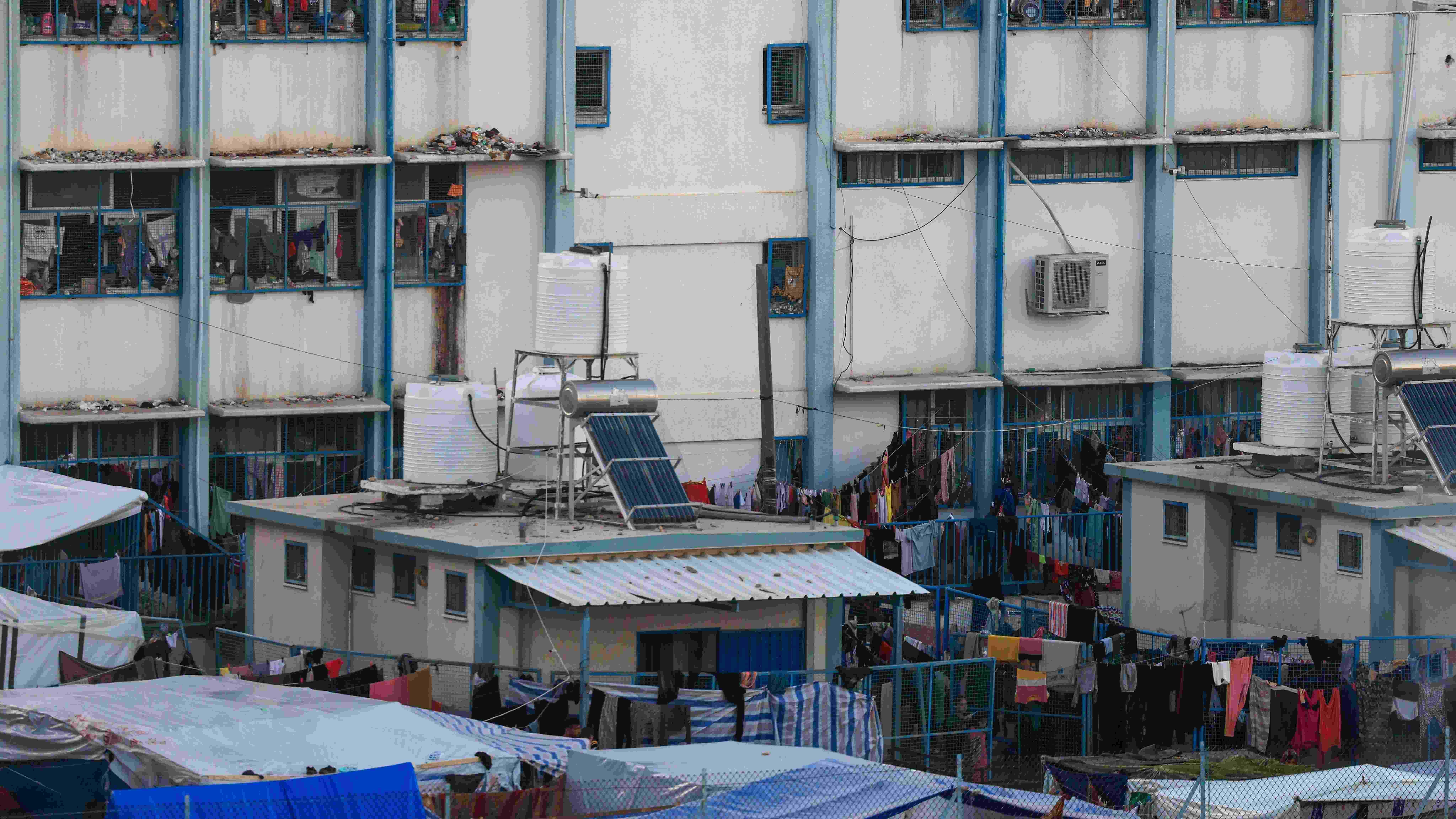Fuel enters Gaza as 26 reported killed in Khan Yunis strike
GAZA STRIP

A first consignment of fuel has entered Gaza, allowing communications to resume in the territory, where a hospital director on Saturday said 26 people had been killed in a strike in Khan Yunis.
A two-day blackout caused by fuel shortages ended after a first delivery arrived from Egypt late Friday, but U.N. officials continued to plead for a ceasefire, warning no part of Gaza is safe.
On Saturday, the director of the Nasser hospital in Khan Yunis said it had received the bodies of 26 people, as well as 23 people with serious injuries, after an air strike on a residential building in the southern region's Hamad city.
The Israeli military did not immediately respond to a request for comment on the report.
It has been pressing operations in Gaza's largest hospital, Al-Shifa in the north of the territory, searching for the Hamas operations centre it says lies beneath.
Israel has vowed to "crush" Hamas in response to the group's Oct. 7 attack, which killed about 1,200 people, most of them civilians, and saw around 240 people taken hostage, according to Israeli officials.
The army's air and ground campaign has since killed 12,000 people, including 5,000 children, according to Hamas, which has ruled Gaza since 2007.
Israel has imposed a siege on the territory, allowing just a trickle of aid in from Egypt but barring shipments of fuel over concerns Hamas could divert supplies for military purposes.
However, on Friday, Israel's war cabinet unanimously agreed to allow two fuel tankers a day "to run the wastewater treatment facilities... which are facing collapse due to the lack of electricity," national security adviser Tzachi Hanegbi said.
"We took that decision to prevent the spread of epidemics," he said.
A senior U.S. official said Washington had exerted huge pressure on Israel for weeks to allow fuel in.
The U.N. agency for Palestinian refugees (UNRWA) said 70 percent of residents have no access to clean water in south Gaza, where raw sewage has begun to flow on the streets.
Under the deal, 140,000 litres (37,000 gallons) of fuel will be allowed in every 48 hours, of which 20,000 litres will be earmarked for generators to restore the phone network, the U.S. official said.
Communications have been down for two days after fuel ran out, and a first consignment of some 17,000 litres was earmarked for telecommunications company Paltel.
The communications blackout hampered aid deliveries, UNRWA said, with humanitarian chief Martin Griffiths telling the U.N. General Assembly that fuel supplies to the agency so far were "a fraction of what is needed to meet the minimum of our humanitarian responsibilities."
The health ministry in the Hamas-ruled territory said 24 patients had died in 48 hours due to the lack of fuel for generators.
Israel has come under scrutiny for operations targeting hospitals in the northern part of Gaza, but says the facilities are being used by Hamas -- a claim rejected by the group and medical staff.
Several thousand people, including wounded patients and premature babies, are believed to be sheltering at the Al-Shifa hospital, where Israeli troops began a raid this week.
Israel's military says it found rifles, ammunition, explosives and the entrance to a tunnel shaft at the hospital complex, claims that cannot be independently verified.
And Prime Minister Benjamin Netanyahu has said, without providing details, that there were "strong indications" hostages may have been held at the medical facility.
Israel has not recovered hostages at the hospital but said it found the bodies of two kidnapped women not far away.
The remains of kidnapped woman soldier Noa Marciano, 19, were found at "a structure adjacent to Al-Shifa hospital" on Friday, a day after the body of 65-year-old Yehudit Weiss was recovered.
Weiss's son Omer said news of his mother's death had devastated the family.
"The officers knocked on the door and we immediately understood," he told AFP, his eyes filled with tears.
"They handed us the notice and the world collapsed."
Those held hostage range from infants to octogenarians, and there has been little information on their fate, despite ongoing negotiations mediated by Qatar and Egypt to secure releases.
'Civilians face starvation'
In Gaza, more than 1.5 million people have been internally displaced, and Israel's blockade has left civilians facing the "immediate possibility of starvation," according to World Food Programme head Cindy McCain.
More than half of Gaza's hospitals are no longer functional due to combat, damage or shortages, and people are waiting four to six hours for half the normal portion of bread.
Israel has told Palestinians to move south for their safety, but deadly air strikes continue to hit central and southern Gaza.
"They said the south was safer, so we moved," Azhar al-Rifi told AFP.
But her family was caught in another strike that killed seven relatives, including her five-year-old nephew.
"Two weeks ago, his mother died, so my husband decided that he would live with us," she said, saying the boy told her: "I can no longer call anyone mom."
"I replied: 'I'm your mother'," she said. "At four in the morning, he was taken away from us."
West Bank violence
Violence in the Israeli-occupied West Bank has surged since the conflict, with Washington urging action to rein in settler attacks on Palestinians.
Raids by Israel's military, which says it is responding to "a significant rise in terrorist attacks," have also multiplied and the Palestinian death toll has soared.
The Israeli army said Friday it had killed at least seven militants in two separate confrontations in the West Bank.
And overnight, the Red Crescent said five people were killed in a strike on the headquarters of Palestinian group Fatah in the West Bank's Balata refugee camp.
Israel's military confirmed "counterterrorism activity" in the area without giving details.
















